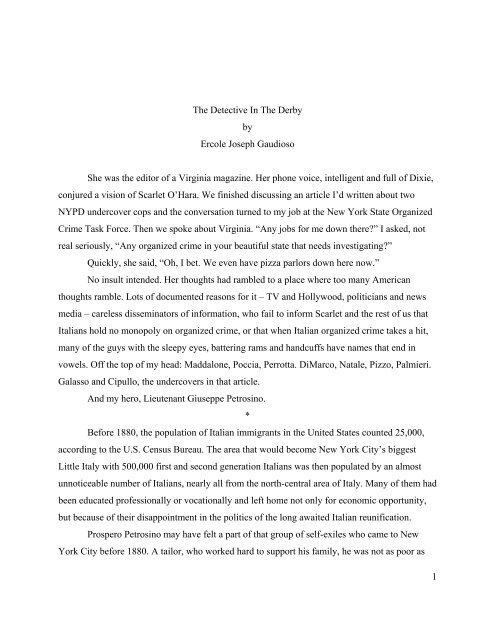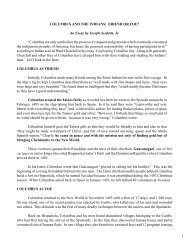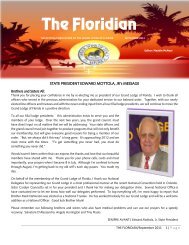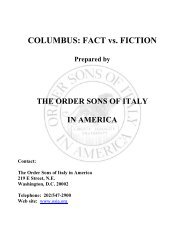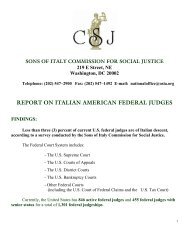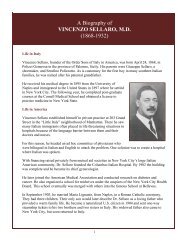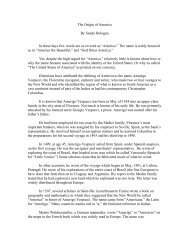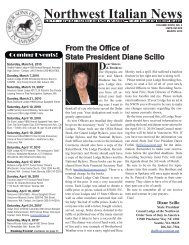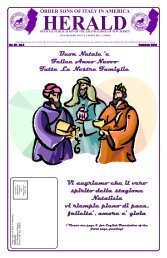The Detective in the Derby - Order Sons of Italy in America
The Detective in the Derby - Order Sons of Italy in America
The Detective in the Derby - Order Sons of Italy in America
You also want an ePaper? Increase the reach of your titles
YUMPU automatically turns print PDFs into web optimized ePapers that Google loves.
<strong>The</strong> <strong>Detective</strong> In <strong>The</strong> <strong>Derby</strong><br />
by<br />
Ercole Joseph Gaudioso<br />
She was <strong>the</strong> editor <strong>of</strong> a Virg<strong>in</strong>ia magaz<strong>in</strong>e. Her phone voice, <strong>in</strong>telligent and full <strong>of</strong> Dixie,<br />
conjured a vision <strong>of</strong> Scarlet O’Hara. We f<strong>in</strong>ished discuss<strong>in</strong>g an article I’d written about two<br />
NYPD undercover cops and <strong>the</strong> conversation turned to my job at <strong>the</strong> New York State Organized<br />
Crime Task Force. <strong>The</strong>n we spoke about Virg<strong>in</strong>ia. “Any jobs for me down <strong>the</strong>re” I asked, not<br />
real seriously, “Any organized crime <strong>in</strong> your beautiful state that needs <strong>in</strong>vestigat<strong>in</strong>g”<br />
Quickly, she said, “Oh, I bet. We even have pizza parlors down here now.”<br />
No <strong>in</strong>sult <strong>in</strong>tended. Her thoughts had rambled to a place where too many <strong>America</strong>n<br />
thoughts ramble. Lots <strong>of</strong> documented reasons for it – TV and Hollywood, politicians and news<br />
media – careless dissem<strong>in</strong>ators <strong>of</strong> <strong>in</strong>formation, who fail to <strong>in</strong>form Scarlet and <strong>the</strong> rest <strong>of</strong> us that<br />
Italians hold no monopoly on organized crime, or that when Italian organized crime takes a hit,<br />
many <strong>of</strong> <strong>the</strong> guys with <strong>the</strong> sleepy eyes, batter<strong>in</strong>g rams and handcuffs have names that end <strong>in</strong><br />
vowels. Off <strong>the</strong> top <strong>of</strong> my head: Maddalone, Poccia, Perrotta. DiMarco, Natale, Pizzo, Palmieri.<br />
Galasso and Cipullo, <strong>the</strong> undercovers <strong>in</strong> that article.<br />
And my hero, Lieutenant Giuseppe Petros<strong>in</strong>o.<br />
*<br />
Before 1880, <strong>the</strong> population <strong>of</strong> Italian immigrants <strong>in</strong> <strong>the</strong> United States counted 25,000,<br />
accord<strong>in</strong>g to <strong>the</strong> U.S. Census Bureau. <strong>The</strong> area that would become New York City’s biggest<br />
Little <strong>Italy</strong> with 500,000 first and second generation Italians was <strong>the</strong>n populated by an almost<br />
unnoticeable number <strong>of</strong> Italians, nearly all from <strong>the</strong> north-central area <strong>of</strong> <strong>Italy</strong>. Many <strong>of</strong> <strong>the</strong>m had<br />
been educated pr<strong>of</strong>essionally or vocationally and left home not only for economic opportunity,<br />
but because <strong>of</strong> <strong>the</strong>ir disappo<strong>in</strong>tment <strong>in</strong> <strong>the</strong> politics <strong>of</strong> <strong>the</strong> long awaited Italian reunification.<br />
Prospero Petros<strong>in</strong>o may have felt a part <strong>of</strong> that group <strong>of</strong> self-exiles who came to New<br />
York City before 1880. A tailor, who worked hard to support his family, he was not as poor as<br />
1
<strong>the</strong> majority <strong>of</strong> his paesani <strong>in</strong> Padula, prov<strong>in</strong>ce <strong>of</strong> Salerno; and maybe when he left <strong>the</strong>re <strong>in</strong> <strong>the</strong><br />
summer <strong>of</strong> 1873 with his wife and six children, he was encouraged by <strong>the</strong> successes <strong>of</strong> previous<br />
Padula emigrants, a certa<strong>in</strong> assurance that <strong>America</strong> was a place <strong>of</strong> promise and acceptance.<br />
Prospero set up home and a tailor shop on <strong>the</strong> legendary East side <strong>of</strong> Manhattan where<br />
his children would grow up <strong>in</strong> an environment free <strong>of</strong> <strong>the</strong> prejudices that would come later.<br />
One <strong>of</strong> <strong>the</strong> Petros<strong>in</strong>o sons, thirteen year old Giuseppe, adapted smoothly to <strong>the</strong> new<br />
world. With ano<strong>the</strong>r thirteen year old, he established a newspaper and shoesh<strong>in</strong>e stand outside<br />
300 Mulberry Street, Police Headquarters, work<strong>in</strong>g that enterprise dur<strong>in</strong>g <strong>the</strong> day and clos<strong>in</strong>g up<br />
shop <strong>in</strong> time for night classes <strong>in</strong> English.<br />
By sixteen Giuseppe – Joe by this time – had learned <strong>the</strong> ways <strong>of</strong> <strong>the</strong> street. He’d<br />
observed <strong>the</strong> best and <strong>the</strong> worst <strong>in</strong> <strong>the</strong> cont<strong>in</strong>ual parade <strong>in</strong> and out <strong>of</strong> 300 Mulberry. At<br />
seventeen, a citizen now, he worked <strong>in</strong> a stockbroker’s <strong>of</strong>fice on Broome Street. A year later he<br />
took a job with <strong>the</strong> city as a “white w<strong>in</strong>ger,” or street cleaner; not a prestigious job, but a steady<br />
one, <strong>the</strong> city’s sanitation duties fixed with<strong>in</strong> <strong>the</strong> structure <strong>of</strong> <strong>the</strong> Police Department, where he<br />
would work under <strong>the</strong> command <strong>of</strong> a capta<strong>in</strong> who would become <strong>the</strong> famous and <strong>in</strong>famous<br />
Inspector Alexander “Clubber” Williams.<br />
In 1880, <strong>the</strong> twenty year old Petros<strong>in</strong>o a supervisor, waves <strong>of</strong> Italians, n<strong>in</strong>ety percent <strong>of</strong><br />
<strong>the</strong>m from <strong>the</strong> south, began arriv<strong>in</strong>g <strong>in</strong> New York City. Too many <strong>of</strong> <strong>the</strong>se immigrants appeared,<br />
accord<strong>in</strong>g to outsiders and to o<strong>the</strong>r sou<strong>the</strong>rners as well, “dirty, quarrelsome, lack<strong>in</strong>g any desire”<br />
to become part <strong>of</strong> <strong>America</strong> and “ready to pull knives at <strong>the</strong> slightest provocation.”<br />
From <strong>the</strong> smallest towns <strong>of</strong> Sicily, from Naples and Calabria, <strong>the</strong>se mostly agricultural<br />
peasants or contad<strong>in</strong>i, were abandon<strong>in</strong>g plots <strong>of</strong> land <strong>the</strong>y farmed for aristocrats, who had little<br />
concern for <strong>the</strong>ir tenants or for agricultural improvements. <strong>The</strong> contad<strong>in</strong>i still labored with <strong>the</strong><br />
same k<strong>in</strong>d <strong>of</strong> wooden plows <strong>the</strong>ir Roman ancestors used two thousand years earlier.<br />
Centuries <strong>of</strong> economic abuse, a high rate <strong>of</strong> illiteracy, exploitation by <strong>the</strong> government and<br />
ignored by <strong>the</strong> Church, <strong>the</strong> patriarchal families <strong>of</strong> isolated communities bonded and survived<br />
under an <strong>in</strong>tense distrust <strong>of</strong> outsiders, both ecclesiastic and government.<br />
Unification, achieved <strong>in</strong> 1860, had <strong>the</strong> work<strong>in</strong>gs to benefit <strong>the</strong> country, but <strong>the</strong> <strong>in</strong>dustrial<br />
and educated north cont<strong>in</strong>ued to dom<strong>in</strong>ate politics. <strong>The</strong> nor<strong>the</strong>rner considered <strong>the</strong> sou<strong>the</strong>rner as<br />
2
arbaric and as exploitable as Africans, did noth<strong>in</strong>g to improve La Miseria, noth<strong>in</strong>g to<br />
discourage <strong>the</strong> grow<strong>in</strong>g exodus.<br />
Emigrants fled not to Brazil and Argent<strong>in</strong>a <strong>the</strong> way many before had; economic<br />
conditions had changed <strong>the</strong>re. Instead, crammed <strong>in</strong>to steerage holds <strong>of</strong> steamers, <strong>the</strong>y departed<br />
for L’<strong>America</strong>, to Nuovo York and Little <strong>Italy</strong>s north, south and west, tak<strong>in</strong>g with <strong>the</strong>m a<br />
cont<strong>in</strong>ued distrust <strong>of</strong> outsiders and committ<strong>in</strong>g <strong>the</strong>mselves to <strong>the</strong> security <strong>of</strong> isolation and <strong>the</strong><br />
ignorance <strong>of</strong> opportunities for upward mobility.<br />
Few possessed <strong>the</strong> cunn<strong>in</strong>g required for crim<strong>in</strong>ality and most held onto <strong>the</strong> fears and<br />
superstitions that made <strong>the</strong>m perfect victims for <strong>the</strong> practitioners <strong>of</strong> La Mala Vita (one <strong>of</strong> many<br />
“bro<strong>the</strong>rhood” gangs, somewhat organized, but <strong>in</strong> this case a phrase to describe a crim<strong>in</strong>al way<br />
<strong>of</strong> life) who traveled with <strong>the</strong>m. And <strong>in</strong> <strong>the</strong> alleys, streets and tenements <strong>of</strong> New York City, <strong>the</strong>se<br />
bad guys – fugitives and escapees, forgers and buyers <strong>of</strong> Italian passports, who would help make<br />
Joe Petros<strong>in</strong>o a legend – arrived too.<br />
*<br />
When Joe Petros<strong>in</strong>o made up his m<strong>in</strong>d to be a cop, some alleged it was because he hated<br />
<strong>the</strong> Sicilians for barr<strong>in</strong>g him from <strong>the</strong>ir gangs because he was not Sicilian. But most agreed his<br />
motivation was borne <strong>of</strong> <strong>the</strong> desire to redeem <strong>the</strong> honor <strong>of</strong> his country, to show Italians to <strong>the</strong><br />
world as honest and hard work<strong>in</strong>g, family oriented and peaceful.<br />
As a “white w<strong>in</strong>ger,” he’d become a confidant and “trusted agent” <strong>of</strong> his boss, Capta<strong>in</strong><br />
Williams, who, <strong>in</strong> 1881, returned to <strong>the</strong> matters <strong>of</strong> patrol and crime. Williams appreciated<br />
Petros<strong>in</strong>o’s value. Fluent <strong>in</strong> almost every dialect <strong>in</strong> Little <strong>Italy</strong>, himself an immigrant, Petros<strong>in</strong>o<br />
couldn’t help but understand La Mala Vita; knew why its victims would not go to <strong>the</strong> police –<br />
outsiders, government – for protection. Little <strong>Italy</strong>, accord<strong>in</strong>g to Williams, needed Joe Petros<strong>in</strong>o.<br />
But he was about five feet, two <strong>in</strong>ches tall, well below <strong>the</strong> five feet, seven-and-one-half<br />
<strong>in</strong>ch requirement for <strong>the</strong> Police Department. Squat and with a round face marked by <strong>the</strong> small<br />
pox he’d suffered as a child, it was difficult for him to look good. A member <strong>of</strong> <strong>the</strong> Italian<br />
Parliament, Luigi Barz<strong>in</strong>i, would know and describe him:<br />
A stout, strong man. His clean-shaven face was coarsely featured and marred by<br />
light pock<strong>in</strong>g; at first sight he did not attract. But <strong>in</strong> that butcher’s face <strong>the</strong>re was<br />
<strong>the</strong> impress <strong>of</strong> a stubborn will and <strong>of</strong> courage, someth<strong>in</strong>g that made one th<strong>in</strong>k <strong>of</strong> a<br />
3
mastiff. <strong>The</strong>re was more <strong>of</strong> <strong>the</strong> wrestler than <strong>of</strong> <strong>the</strong> policeman <strong>in</strong> Petros<strong>in</strong>o. One<br />
sensed that he was better at thrash<strong>in</strong>g <strong>the</strong> evildoer than at f<strong>in</strong>d<strong>in</strong>g him.<br />
After political maneuvers by Capta<strong>in</strong> Williams, on October 19, 1883, at twenty-three<br />
years old, Joe Petros<strong>in</strong>o became New York’s shortest cop. But built like a fire hydrant, he<br />
bragged that <strong>the</strong> generosity <strong>of</strong> his violence compensated for what he <strong>of</strong>ten compla<strong>in</strong>ed about as<br />
“<strong>America</strong>’s liberal laws” and <strong>the</strong> frustration <strong>of</strong> trials, lawyers and political <strong>in</strong>terference; that if<br />
<strong>the</strong> system cut loose a murderer, kidnapper, bomb thrower, Petros<strong>in</strong>o needed to <strong>in</strong>sure that <strong>the</strong><br />
bad guy would remember him.<br />
Dur<strong>in</strong>g his first assignment, a foot post on East 13 th Street, a black man, his name<br />
reported only as Wash<strong>in</strong>gton, was attacked by three men. <strong>The</strong> brand new cop rescued <strong>the</strong> man<br />
and left his three attackers beaten and sprawled on <strong>the</strong> sidewalk.<br />
Stories <strong>of</strong> Petros<strong>in</strong>o’s skill and eagerness at fisticuffs splattered <strong>the</strong> newspapers <strong>of</strong> <strong>the</strong><br />
late 19 th and early 20 th centuries and helped propel his career. In 1890 he was made a detective,<br />
put away his uniform and replaced it with bus<strong>in</strong>ess suits, Pr<strong>in</strong>ce Albert overcoats and, to help his<br />
height, double-soled shoes and a tall derby. In newspapers he became “<strong>the</strong> detective <strong>in</strong> <strong>the</strong><br />
derby.” In photos Petros<strong>in</strong>o looks pretty sharp; a real swell, as <strong>the</strong>y used to say.<br />
In those days police brutality was less <strong>of</strong> an issue than it is now and, when it came to bad<br />
guys, <strong>the</strong> art <strong>of</strong> <strong>the</strong> baton was appreciated, particularly by one Police Commissioner who<br />
advocated walk<strong>in</strong>g s<strong>of</strong>tly and carry<strong>in</strong>g a big stick. On July 20, 1895, Commissioner <strong>The</strong>odore<br />
Roosevelt, known by his cops as “Silk Socks,” promoted Petros<strong>in</strong>o to <strong>Detective</strong> Sergeant. <strong>The</strong><br />
first time an Italian had achieved that rank and, already assigned to Homicide, Petros<strong>in</strong>o worked<br />
only major Italian related <strong>in</strong>vestigations.<br />
As Italian crime and victimization <strong>in</strong> <strong>the</strong> big cities became known around <strong>the</strong> country, so<br />
did <strong>the</strong> detective <strong>in</strong> <strong>the</strong> derby. A relationship developed between Petros<strong>in</strong>o and Roosevelt, both<br />
dedicated crime fighters. <strong>The</strong> men saw each o<strong>the</strong>r frequently and, while <strong>the</strong> Italian press was<br />
largely unk<strong>in</strong>d to Petros<strong>in</strong>o, he was a swee<strong>the</strong>art <strong>of</strong> <strong>the</strong> <strong>America</strong>n press and never lost an<br />
opportunity to praise Roosevelt, never ignored a chance to talk with reporters.<br />
Om<strong>in</strong>ously perhaps, he had let his work rule his life, had left neighborhood and friends to<br />
live <strong>in</strong> a bachelor apartment on <strong>the</strong> fourth floor <strong>of</strong> 233 Lafayette Street, say<strong>in</strong>g he wanted to keep<br />
4
his family free from reprisals (though by some accounts he was a loner and his family saw him<br />
rarely). His closets conta<strong>in</strong>ed a wardrobe <strong>of</strong> disguises. He could be a beggar, a gangster, a<br />
bartender, a Hasidic Jew; as a Sicilian laborer he dug <strong>the</strong> tunnels and roads <strong>of</strong> Manhattan.<br />
*<br />
On <strong>the</strong> night <strong>of</strong> July 17, 1898, two cops on Leonard Street, a divid<strong>in</strong>g l<strong>in</strong>e between<br />
Ch<strong>in</strong>atown and Little <strong>Italy</strong>, heard screams com<strong>in</strong>g from Baxter Street. <strong>The</strong>y found forty-two year<br />
old Natale Brogno bloody and dead on <strong>the</strong> ground and, near him with a bloodsta<strong>in</strong>ed knife <strong>in</strong> his<br />
hand, twenty-five year old Angelo Carboni. Brogno and Carboni, from <strong>the</strong> same Sicilian village,<br />
had become engaged <strong>in</strong> a dispute <strong>in</strong>side <strong>the</strong> Tr<strong>in</strong>acria Café, a Sicilian hangout <strong>in</strong> <strong>the</strong> vic<strong>in</strong>ity <strong>of</strong><br />
<strong>the</strong> crime scene.<br />
Carboni claimed that <strong>in</strong> <strong>the</strong> dark he and Brogno had fought with fists. Brogno fell,<br />
Carboni bent down to lift him, found <strong>the</strong> knife <strong>in</strong> Brogno’s back, took it out, and that was why he<br />
had <strong>the</strong> knife <strong>in</strong> his hand. No one believed <strong>the</strong> story (who would), Carboni was convicted and<br />
sentenced to death.<br />
Hang<strong>in</strong>g around <strong>the</strong> streets and bars, ga<strong>the</strong>r<strong>in</strong>g <strong>in</strong>telligence on o<strong>the</strong>r matters, Petros<strong>in</strong>o<br />
learned <strong>of</strong> <strong>the</strong> rumor that Carboni was go<strong>in</strong>g to <strong>the</strong> electric chair for someone else. Petros<strong>in</strong>o<br />
looked <strong>in</strong>to <strong>the</strong> <strong>in</strong>vestigation from scratch, refus<strong>in</strong>g to look at reports <strong>of</strong> <strong>the</strong> patrol force or <strong>the</strong><br />
<strong>Detective</strong> Bureau. From <strong>in</strong>formants he learned that Carboni was an honest, work<strong>in</strong>g man with a<br />
family; that <strong>the</strong> victim, Brogno, had many enemies and that one <strong>of</strong> <strong>the</strong>m, sixty-two year old<br />
Salvatore Ceramello, known for violence, had been <strong>in</strong> <strong>the</strong> Tr<strong>in</strong>acria Café <strong>the</strong> even<strong>in</strong>g <strong>of</strong> <strong>the</strong> fight<br />
and had not been seen s<strong>in</strong>ce.<br />
Petros<strong>in</strong>o set out on a month long search that took him to Jersey City, Philadelphia,<br />
Montreal and Nova Scotia and back to New York where he found a cous<strong>in</strong> <strong>of</strong> Ceramello. In<br />
various disguises he followed <strong>the</strong> cous<strong>in</strong> to <strong>the</strong> Bronx, back to Philadelphia, <strong>the</strong>n to a house on<br />
<strong>the</strong> outskirts <strong>of</strong> Baltimore.<br />
He knocked on <strong>the</strong> door. A woman answered.<br />
Petros<strong>in</strong>o identified himself as be<strong>in</strong>g from <strong>the</strong> Board <strong>of</strong> Health <strong>in</strong>vestigat<strong>in</strong>g a case <strong>of</strong><br />
smallpox. Inside he found <strong>the</strong> man he’d followed and an older man, who was chopp<strong>in</strong>g wood at<br />
<strong>the</strong> stove.<br />
5
He asked that man, “What is your name”<br />
“My name is Fiani.”<br />
“Your name is Ceramello,” Petros<strong>in</strong>o said, snatched <strong>the</strong> hatchet and clicked on <strong>the</strong> cuffs.<br />
Angelo Carboni was released from prison a week before his execution date. Salvatore<br />
Ceramello took his seat.<br />
*<br />
If you have not sufficient courage you may go to people who enjoy an honorable reputation<br />
and be careful as to whom you go. Thus you may stop us from persecut<strong>in</strong>g you as you have<br />
been adjudged to give money or life. Woe upon you if you do not resolve to buy your future<br />
happ<strong>in</strong>ess, you can do from us by giv<strong>in</strong>g <strong>the</strong> money demanded.<br />
This letter and o<strong>the</strong>rs like it, estimated at thousands through <strong>the</strong> years, were signed with a<br />
crudely drawn black hand or fist, sometimes gripp<strong>in</strong>g a knife or a gun. Knives or c<strong>of</strong>f<strong>in</strong>s edged<br />
some letters, skulls emphasized a threat, promised a punishment for ignor<strong>in</strong>g a demand for<br />
money. Mean<strong>in</strong>gful communication for a people born <strong>in</strong>to a culture packed with stories <strong>of</strong><br />
Sicily’s Mafia, Napoli’s Camorra, Calabria’s Fibbia; and folklore that whispered <strong>of</strong> gangsters<br />
like Lupo <strong>the</strong> Wolf, capable <strong>of</strong> cast<strong>in</strong>g <strong>the</strong> awful, evil eye and command<strong>in</strong>g o<strong>the</strong>r magical<br />
powers; fearful people who crossed <strong>the</strong>mselves at <strong>the</strong> mention <strong>of</strong> La Mano Nera, and who, upon<br />
receiv<strong>in</strong>g a Black Hand note, paid immediately because ignored demands had resulted <strong>in</strong><br />
murders and maim<strong>in</strong>gs, assaults and bomb<strong>in</strong>gs.<br />
<strong>The</strong> newspapers referred to a Black Hand Society and little doubt rema<strong>in</strong>ed <strong>in</strong> Little <strong>Italy</strong><br />
that <strong>the</strong> Black Hand was as organized and powerful as was <strong>the</strong> Mafia back <strong>in</strong> Sicily<br />
Lupo <strong>the</strong> Wolf was Ignazio Lupo, also known to use his mo<strong>the</strong>r’s maiden name <strong>of</strong><br />
Saietta. <strong>The</strong> most notorious <strong>of</strong> New York City Black Handers, he ma<strong>in</strong>ta<strong>in</strong>ed, with his bro<strong>the</strong>r<strong>in</strong>-law,<br />
Joe Morello, a stable up <strong>in</strong> Harlem’s Little <strong>Italy</strong>. Located at 323 East 107 th Street, <strong>the</strong><br />
stable would become known as <strong>the</strong> “Murder Stable,” burial site for more than 60 enemies and<br />
recalcitrant Black Hand targets.<br />
Lupo and Morello paraded <strong>the</strong>ir activities through <strong>the</strong> streets <strong>of</strong> Little <strong>Italy</strong>s, fortify<strong>in</strong>g<br />
<strong>the</strong> perception that <strong>the</strong>y were magically protected and untouchable. As with <strong>the</strong> mention <strong>of</strong> <strong>the</strong><br />
Black Hand, people crossed <strong>the</strong>mselves when <strong>the</strong>y heard <strong>of</strong> Lupo or Morello.<br />
But Petros<strong>in</strong>o found no evidence <strong>of</strong> Black Hand leadership, hierarchy or structure. Black<br />
6
Hand letters, written <strong>in</strong> a mixture <strong>of</strong> dialects, <strong>the</strong> menac<strong>in</strong>g hand drawn <strong>in</strong> variously crude<br />
designs, <strong>in</strong>dicated an absence <strong>of</strong> organization. Arrests <strong>of</strong> <strong>in</strong>dividuals for Black Hand<br />
shakedowns, none connected to one ano<strong>the</strong>r, some not even Italian, fur<strong>the</strong>r fortified Petros<strong>in</strong>o’s<br />
certa<strong>in</strong>ty.<br />
An anarchist Society <strong>of</strong> <strong>the</strong> Black Hand did exist, its history <strong>in</strong> Europe. But politics had<br />
noth<strong>in</strong>g to do with extortion <strong>in</strong> New York City. While most immigrants ignored that explanation<br />
and chose to comply with Black Hand demands, some refused.<br />
Gaetano Costa, successful butcher from Brooklyn received a demand:<br />
You have more money than we have. We know <strong>of</strong> your wealth and that<br />
you are alone <strong>in</strong> this country. We want $1000, which you are to put <strong>in</strong> a<br />
loaf <strong>of</strong> bread and hand to a man who comes <strong>in</strong> to buy meat and pulls out a<br />
red handkerchief.<br />
Costa ignored <strong>the</strong> man with <strong>the</strong> handkerchief and was shot and killed <strong>in</strong> his butcher shop.<br />
Though it was known that <strong>the</strong> killers worked for Lupo <strong>the</strong> Wolf, lips rema<strong>in</strong>ed sealed and no one<br />
was ever charged.<br />
*<br />
On December 22, 1898, Antonio Sperduto was wander<strong>in</strong>g along <strong>the</strong> Bowery <strong>in</strong> desperate<br />
condition. Cops couldn’t understand what he was say<strong>in</strong>g and connected him with Petros<strong>in</strong>o.<br />
Sperduto told <strong>the</strong> detective that he’d left his wife and four kids <strong>in</strong> San Piero Patti, Sicily, about<br />
six months earlier. Almost immediately he began work digg<strong>in</strong>g subway tunnels. To save money,<br />
he lived on virtually noth<strong>in</strong>g but bread and milk and when <strong>the</strong> job ended and he’d given <strong>the</strong><br />
hir<strong>in</strong>g agent and his foreman <strong>the</strong>ir “cuts,” he had a sav<strong>in</strong>gs <strong>of</strong> one hundred and two dollars, just<br />
enough to br<strong>in</strong>g his family to <strong>America</strong>. He had gone to <strong>the</strong> steamship l<strong>in</strong>e <strong>of</strong>fice to set up <strong>the</strong>ir<br />
passage and after leav<strong>in</strong>g, a stranger approached him.<br />
“He was well dressed and he seemed glad to see me,” Sperduto said.<br />
<strong>The</strong>n Petros<strong>in</strong>o told him <strong>the</strong> rest <strong>of</strong> <strong>the</strong> story. “He addressed you by your name and said<br />
he had known you as a boy <strong>in</strong> Sicily and he <strong>in</strong>vited you for a dr<strong>in</strong>k to celebrate <strong>the</strong> meet<strong>in</strong>g. You<br />
went with him.”<br />
“And I had a dr<strong>in</strong>k and woke up <strong>in</strong> a dark alley, <strong>in</strong> my vomit and my wallet was gone.”<br />
7
Petros<strong>in</strong>o locked up one Giuseppe Giuliano for <strong>the</strong> robbery and <strong>in</strong> 1899, <strong>in</strong> a connected<br />
<strong>in</strong>vestigation, locked up 112 conspirators <strong>of</strong> <strong>the</strong> “Insurance Gang.” Pretend<strong>in</strong>g to be <strong>in</strong>surance<br />
salesmen, <strong>the</strong>y would persuade <strong>the</strong>ir simple compatriots to take out life <strong>in</strong>surance on credit. <strong>The</strong><br />
<strong>in</strong>sured <strong>the</strong>n had his policy without hav<strong>in</strong>g laid out a penny, for it was <strong>the</strong> friendly agent who<br />
advanced <strong>the</strong> premium and, for <strong>the</strong> simple matter <strong>of</strong> security, made himself <strong>the</strong> beneficiary, a<br />
detail that later would be simple to change.<br />
People who bought <strong>the</strong> <strong>in</strong>surance seldom survived <strong>the</strong> year.<br />
*<br />
Gaetano Bresci lived <strong>in</strong> “a large Italian colony” <strong>in</strong> Paterson, New Jersey, many <strong>of</strong> its<br />
members hav<strong>in</strong>g come from <strong>the</strong> north-central region <strong>of</strong> <strong>Italy</strong> and were connected with a<br />
European anarchist movement. On July 30, 1900, <strong>in</strong> Monza, near Milan, Bresci assass<strong>in</strong>ated<br />
K<strong>in</strong>g Umberto <strong>of</strong> <strong>Italy</strong>.<br />
A few days after <strong>the</strong> assass<strong>in</strong>ation and <strong>in</strong> cooperation with <strong>the</strong> United States Secret<br />
Service with whom he’d worked counterfeit<strong>in</strong>g <strong>in</strong>vestigations, Petros<strong>in</strong>o, with identification as<br />
newly arrived Italian immigrant, Pietro Moretti, took a room <strong>in</strong> Bertoldi’s Hotel, quarters for<br />
many <strong>of</strong> <strong>the</strong> Paterson anarchists. For three months “Moretti” worked as an unskilled laborer,<br />
lived <strong>in</strong> <strong>the</strong> hotel and learned that before <strong>the</strong> K<strong>in</strong>g’s assass<strong>in</strong>ation, Bresci had lived <strong>the</strong>re with his<br />
Irish wife, Sophie Knieland.<br />
Shortly before <strong>the</strong> three month operation ended, Petros<strong>in</strong>o discovered Bresci’s affiliation<br />
with <strong>the</strong> real Black Hand Society <strong>of</strong> Europe and, from Sophie Knieland, learned that Bresci had<br />
been chosen by lot as Umberto’s executioner. He learned too that <strong>the</strong> anarchists had also targeted<br />
Emperor Wilhelm II <strong>of</strong> Germany, Emperor Franz Josef <strong>of</strong> Austria-Hungary, and <strong>the</strong> President <strong>of</strong><br />
<strong>the</strong> United States, William McK<strong>in</strong>ley.<br />
Upon hear<strong>in</strong>g Petros<strong>in</strong>o’s warn<strong>in</strong>g, McK<strong>in</strong>ley responded, “I don’t fall <strong>in</strong>to that category.<br />
Why should <strong>the</strong>y kill me when <strong>the</strong>y’re perfectly free to vote aga<strong>in</strong>st me” His Vice President and<br />
Petros<strong>in</strong>o’s old boss, Teddy Roosevelt, said, “I certa<strong>in</strong>ly hope it will not be <strong>the</strong> anarchists who<br />
will make me President.”<br />
On December 6, 1901, at <strong>the</strong> Pan <strong>America</strong>n Exposition <strong>in</strong> Buffalo, New York, Leo<br />
Czolgosz, a Pole, shot and killed President McK<strong>in</strong>ley. In Czolgosz’s wallet cops found a<br />
8
newspaper clipp<strong>in</strong>g that reported Bresci’s act, but <strong>in</strong>vestigators could not connect <strong>the</strong> Pole to any<br />
anarchist movement.<br />
*<br />
July 23, 1902. Two kids <strong>in</strong> Brooklyn, prepar<strong>in</strong>g for a swim where Seventy-third Street<br />
meets <strong>the</strong> bay, were hid<strong>in</strong>g <strong>the</strong>ir clo<strong>the</strong>s <strong>in</strong> <strong>the</strong> tall grass, when <strong>the</strong>y found a barrel. <strong>The</strong>y looked<br />
<strong>in</strong>to it and called <strong>the</strong> cops.<br />
<strong>The</strong> body <strong>in</strong>side, a man with all <strong>the</strong> major bones <strong>in</strong> his body broken, his throat slit ear to<br />
ear, would be identified as Joe Catania, boss <strong>of</strong> <strong>the</strong> Brooklyn end <strong>of</strong> a Palermo-New York<br />
counterfeit money operation run by Joe Morello, bro<strong>the</strong>r-<strong>in</strong>-law to Lupo <strong>the</strong> Wolf. When<br />
Catania’s dr<strong>in</strong>k<strong>in</strong>g got him talk<strong>in</strong>g too much, he needed to be killed.<br />
April 14, 1903, Manhattan, six <strong>in</strong> <strong>the</strong> morn<strong>in</strong>g. From her fifth floor w<strong>in</strong>dow, Carmel<strong>in</strong>a<br />
Zillo looked down on East 11 th Street near 3 rd Avenue. Where <strong>the</strong> sidewalk edged a vacant lot,<br />
sat a barrel. A widow with four kids, Carmel<strong>in</strong>a could not ignore <strong>the</strong> possibility that it conta<strong>in</strong>ed<br />
someth<strong>in</strong>g valuable, or that someone would give her someth<strong>in</strong>g for it. She dressed, went down to<br />
<strong>the</strong> street, looked <strong>in</strong>to <strong>the</strong> barrel and fa<strong>in</strong>ted. Somebody called <strong>the</strong> cops.<br />
Patrolman John O’Brien responded and exam<strong>in</strong>ed <strong>the</strong> barrel. Stick<strong>in</strong>g out from sawdust<br />
was a man’s head. <strong>The</strong> case would become known as “<strong>the</strong> man who was cut to pieces” and, more<br />
popularly, “<strong>the</strong> man <strong>in</strong> <strong>the</strong> barrel case.”<br />
Petros<strong>in</strong>o responded and, after a prelim<strong>in</strong>ary <strong>in</strong>vestigation, addressed <strong>the</strong> press who<br />
quoted him as say<strong>in</strong>g, “<strong>The</strong> man <strong>in</strong> <strong>the</strong> barrel was certa<strong>in</strong>ly an Italian and probably a Sicilian. I<br />
th<strong>in</strong>k he was murdered to settle a quarrel <strong>in</strong> some gang or o<strong>the</strong>r.”<br />
A reporter asked if he would attribute <strong>the</strong> crime to <strong>the</strong> Black Hand. He replied, “I’ve told<br />
you many times before that <strong>the</strong> ‘Black Hand’ doesn’t exist as a function<strong>in</strong>g organization. It’s <strong>the</strong><br />
newspapers that have built up <strong>the</strong> myth <strong>of</strong> an octopus that’s supposed to have <strong>the</strong> whole <strong>of</strong> New<br />
York City <strong>in</strong> its tentacles,” and went on to say that small gangs, not connected to one ano<strong>the</strong>r<br />
have appropriated <strong>the</strong> name to frighten <strong>the</strong>ir victims.<br />
He had <strong>the</strong> crime scene photographed and exam<strong>in</strong>ed, traced <strong>the</strong> barrel to a German<br />
confectioner at 365 Wash<strong>in</strong>gton Street, and connected <strong>the</strong> sawdust to <strong>The</strong> Star <strong>of</strong> <strong>Italy</strong>, a bar and<br />
Sicilian hangout at 260 Elizabeth Street. <strong>The</strong> two locations shared a common alley and<br />
9
detectives established that <strong>the</strong> man <strong>in</strong> <strong>the</strong> barrel had been killed <strong>in</strong> <strong>The</strong> Star <strong>of</strong> <strong>Italy</strong> and one <strong>of</strong><br />
<strong>the</strong> confectioner’s barrels appropriated for <strong>the</strong> disposal.<br />
Subsequent <strong>in</strong>vestigation brought <strong>in</strong> <strong>the</strong> Secret Service and <strong>the</strong> <strong>in</strong>vestigation <strong>of</strong> a<br />
counterfeit r<strong>in</strong>g with connections <strong>in</strong> New Orleans, Pittsburgh and Palermo. Eight Sicilians were<br />
arrested, among <strong>the</strong>m <strong>the</strong> feared Joe Morello and Ignazio Lupo; Tommaso “<strong>The</strong> Ox” Petto, cop<br />
fighter and knife man who had killed <strong>the</strong> Manhattan man <strong>in</strong> <strong>the</strong> barrel; and Vito Cascio Ferro,<br />
two years <strong>in</strong> this country, on <strong>the</strong> run from murder charges <strong>in</strong> Sicily, documented <strong>the</strong>re as a “Man<br />
<strong>of</strong> Respect,” a subtle and respectful reference to a Mafia member. It was his smuggl<strong>in</strong>g operation<br />
(run by Morello) <strong>of</strong> counterfeit bills stashed <strong>in</strong> shipments <strong>of</strong> olive oil that talkative victim Joe<br />
Catania managed and who would mean more to Petros<strong>in</strong>o than any <strong>of</strong> <strong>the</strong> o<strong>the</strong>rs.<br />
That second barrel victim, identified as Benedetto Madonnia, also a counterfeiter, had not<br />
only been cutt<strong>in</strong>g <strong>in</strong> on Lupo’s operation, but had demanded money on behalf <strong>of</strong> an <strong>in</strong>carcerated<br />
bro<strong>the</strong>r-<strong>in</strong>-law and member <strong>of</strong> <strong>the</strong> Lupo gang for his share <strong>in</strong> <strong>the</strong> funny-money proceeds.<br />
With cash bundled <strong>in</strong> a handkerchief and delivered to court, all defendants made bail<br />
before Petros<strong>in</strong>o returned from a trip to Buffalo where he had dug up evidence connect<strong>in</strong>g all his<br />
defendants with <strong>the</strong> counterfeit r<strong>in</strong>g that would return <strong>the</strong>m to <strong>the</strong> Tombs and <strong>in</strong>dict Ferro, as <strong>the</strong><br />
central conspirator <strong>in</strong> <strong>the</strong> “man <strong>in</strong> <strong>the</strong> barrel homicide.”<br />
<strong>The</strong> next day six <strong>of</strong> <strong>the</strong> eight were rearrested. Two had skipped. Ferro to New Orleans<br />
where his <strong>in</strong>fluence had already established a Mafia stronghold; on September 28, 1904 he<br />
would manage a return to Sicily, where danger <strong>of</strong> charges aga<strong>in</strong>st him had disappeared. Petto<br />
vanished but would reappear <strong>in</strong> 1909.<br />
Morello and Lupo stood trial for <strong>the</strong> manufacture and sale <strong>of</strong> counterfeit money, were<br />
convicted each received 25 years. Accord<strong>in</strong>g to some sources, however, <strong>the</strong>ir sentences were<br />
suspended—reason unknown.<br />
*<br />
Petros<strong>in</strong>o had been adamant that <strong>the</strong>re was no organization to <strong>the</strong> Black Hand, but he was<br />
challenged by some, not unfriendly newspaper reporters among <strong>the</strong>m, who asked why, if <strong>the</strong>re<br />
was no organization, why did <strong>the</strong> extortion stop after <strong>the</strong> pay<strong>of</strong>f Though this was not always <strong>the</strong><br />
case, Petros<strong>in</strong>o reconsidered his thoughts when he learned, <strong>in</strong> 1903, <strong>of</strong> an emerg<strong>in</strong>g, less bloody<br />
10
method <strong>of</strong> extortion that would become known as protection, with demands tailored to <strong>the</strong><br />
victim’s ability to pay. Signs <strong>of</strong> organization, accord<strong>in</strong>g to Petros<strong>in</strong>o. “It’s our own stupid laws,”<br />
he said, “that have allowed <strong>the</strong>m to organize.”<br />
With this new form <strong>of</strong> extortion, a regular payment would keep victims on a regular tax<br />
with fixed due dates and amounts <strong>in</strong>stead <strong>of</strong> lump sum demands. One victim told Petros<strong>in</strong>o:<br />
<strong>The</strong>y came to see me <strong>the</strong> o<strong>the</strong>r even<strong>in</strong>g. <strong>The</strong>re were three <strong>of</strong> <strong>the</strong>m, with<br />
ugly faces, but elegantly dressed and very polite. <strong>The</strong>y knew I’d received<br />
knife letters <strong>in</strong> <strong>the</strong> past and so <strong>the</strong>y <strong>of</strong>fered me <strong>the</strong>ir protection. “Just have<br />
faith <strong>in</strong> us,” <strong>the</strong>y said with <strong>the</strong>ir hands on <strong>the</strong>ir hearts, “and from now on<br />
nobody will touch a hair <strong>of</strong> your head or your family’s.”<br />
Petros<strong>in</strong>o had no way <strong>of</strong> know<strong>in</strong>g yet that <strong>the</strong> new, “benevolent” method <strong>of</strong> protection<br />
(that still exists today) had been implemented by Vito Cascio Ferro, <strong>the</strong> “man <strong>of</strong> respect,” who<br />
carried a photo <strong>of</strong> Petros<strong>in</strong>o <strong>in</strong> his wallet, vow<strong>in</strong>g, “I swear that I will kill this man with my own<br />
hands.”<br />
Ferro’s philosophy about extortion was to skim <strong>the</strong> cream <strong>of</strong>f <strong>the</strong> milk “without break<strong>in</strong>g<br />
<strong>the</strong> bottle,” to not throw people <strong>in</strong>to bankruptcy with ridiculous demands for money. “Offer <strong>the</strong>m<br />
protection <strong>in</strong>stead, help <strong>the</strong>m to make <strong>the</strong>ir bus<strong>in</strong>esses prosperous and not only will <strong>the</strong>y be<br />
happy, but <strong>the</strong>y’ll kiss your hands out <strong>of</strong> gratitude.”<br />
In Sicily, <strong>the</strong> uneducated but <strong>in</strong>telligent Ferro would establish Mafia control <strong>of</strong> a dozen<br />
cities, organiz<strong>in</strong>g and controll<strong>in</strong>g all <strong>the</strong> trades, even assign<strong>in</strong>g steady beats for beggars. He<br />
associated with royalty and politicians.<br />
Court and police records that once named him an anarchist and a crim<strong>in</strong>al, now<br />
represented him as one who conducts “himself irreproachably . . . has formed new and legitimate<br />
friendships with Baron Inglese and <strong>the</strong> Honorable De Michele Ferranti.”<br />
At <strong>the</strong> end <strong>of</strong> 1904, <strong>the</strong> “man <strong>of</strong> respect,” held <strong>in</strong> high esteem by Joe Morello and Lupo<br />
<strong>the</strong> Wolf, set up what had already been established between New Orleans and Palermo, a Mafia<br />
communication, or “black bridge,” between New York and Palermo.<br />
*<br />
Petros<strong>in</strong>o had been ask<strong>in</strong>g for a squad <strong>of</strong> Italian speak<strong>in</strong>g cops to cope with Black<br />
Handers even before he had determ<strong>in</strong>ed that an organized Mafia and a Camorra existed. His<br />
11
equest had been refused many times, <strong>the</strong>n, <strong>in</strong> January <strong>of</strong> 1905, five years after New York had<br />
been recognized as <strong>the</strong> biggest Italian city after Naples, Police Commissioner William McAdoo<br />
announced that <strong>the</strong> Board <strong>of</strong> Alderman had authorized a squad <strong>of</strong> five Sicilian speak<strong>in</strong>g men to<br />
police Little <strong>Italy</strong>’s half <strong>of</strong> a million Italians and Italian-<strong>America</strong>ns.<br />
On January 20 th , <strong>the</strong> Italian Squad was <strong>of</strong>ficially founded and manned by Peter Dondero,<br />
George Silva, John Lagomars<strong>in</strong>i, Ugo Cassidi who liked to be called Hugh Cassidy or Butch<br />
Cassidy, and Maurice Bonoil, French and Irish, but raised <strong>in</strong> Little <strong>Italy</strong> and spoke Sicilian as<br />
well as <strong>the</strong> o<strong>the</strong>rs.<br />
<strong>The</strong> squad began ga<strong>the</strong>r<strong>in</strong>g <strong>in</strong>telligence <strong>of</strong> crim<strong>in</strong>al activity <strong>in</strong> <strong>the</strong> City and <strong>in</strong> <strong>the</strong> State <strong>of</strong><br />
New York. With <strong>in</strong>telligence came arrests and <strong>in</strong>dictments, Petros<strong>in</strong>o encourag<strong>in</strong>g his squad to<br />
use <strong>the</strong> methods to which he rema<strong>in</strong>ed true. “If <strong>the</strong> courts send <strong>the</strong>se crim<strong>in</strong>als back <strong>in</strong>to <strong>the</strong><br />
streets, we’ll make life so tough for <strong>the</strong>m that <strong>the</strong>y’ll have to clear out whatever way <strong>the</strong>y can.”<br />
On January 1, 1906, a year after <strong>the</strong> Italian Squad was formed, <strong>The</strong>odore B<strong>in</strong>gham, a<br />
personal friend <strong>of</strong> Teddy Roosevelt, became Police Commissioner. With<strong>in</strong> four months <strong>the</strong><br />
Italian Squad became known as <strong>the</strong> Italian Legion with twenty-five men plus a detachment <strong>of</strong> ten<br />
<strong>in</strong> Brooklyn commanded by Sergeant Antonio Vachris (Vacarezza).<br />
In November <strong>of</strong> that year, Petros<strong>in</strong>o was promoted to Lieutenant, <strong>the</strong> first Italian to<br />
achieve that rank. He, Vachris and Dondero and new member, Alex DeMart<strong>in</strong>o, celebrated at<br />
V<strong>in</strong>cent Saul<strong>in</strong>o’s restaurant on <strong>the</strong> corner <strong>of</strong> Lafayette and Spr<strong>in</strong>g Streets where Petros<strong>in</strong>o was a<br />
steady customer. Saul<strong>in</strong>o’s daughter, thirty-seven year old Adel<strong>in</strong>a, widowed and childless, had<br />
caught Petros<strong>in</strong>o’s eye and, at forty-six, on that night <strong>of</strong> his promotion, Petros<strong>in</strong>o and a few<br />
glasses <strong>of</strong> w<strong>in</strong>e proposed. On <strong>the</strong> first Sunday <strong>in</strong> April, 1907 <strong>the</strong>y were married <strong>in</strong> St. Patrick’s<br />
Old Ca<strong>the</strong>dral. <strong>The</strong> Italian Squad attended as did Commissioner B<strong>in</strong>gham.<br />
<strong>The</strong> groom was too busy for a honeymoon. <strong>The</strong> newlyweds set up home <strong>in</strong> Petros<strong>in</strong>o’s<br />
apartment where Adel<strong>in</strong>a found herself alone much <strong>of</strong> <strong>the</strong> time, someth<strong>in</strong>g she’d anticipated,<br />
be<strong>in</strong>g married to a most famous and most hated cop. She learned to live with <strong>the</strong> anonymous<br />
threats, to never show herself at a w<strong>in</strong>dow, especially at night.<br />
Petros<strong>in</strong>o and <strong>the</strong> squad had been gr<strong>in</strong>d<strong>in</strong>g out large numbers <strong>of</strong> deportment orders. It<br />
seems that much <strong>of</strong> <strong>the</strong>ir <strong>in</strong>telligence focused on <strong>the</strong> Neopolitan Camorra, a somewhat<br />
12
differently organized version <strong>of</strong> <strong>the</strong> Sicilian Mafia. His success with <strong>the</strong> Mafia was never as<br />
complete as with <strong>the</strong> Camorra, probably because his roots and those <strong>of</strong> his sources had been<br />
nourished <strong>in</strong> <strong>the</strong> same soil and <strong>the</strong>ir words fell comfortably toge<strong>the</strong>r. One story needs tell<strong>in</strong>g.<br />
On April 17, 1907, armed with a deportment order, <strong>the</strong> Italian Squad visited an apartment<br />
up <strong>in</strong> Italian Harlem. Enrico Alfano, <strong>the</strong> Camorra boss <strong>of</strong> bosses, or “Grand Master” and fugitive<br />
from murder charges <strong>in</strong> <strong>Italy</strong>, was <strong>in</strong> that apartment with three men. Petros<strong>in</strong>o kicked down <strong>the</strong><br />
door, kicked down Alfano and dragged him down <strong>the</strong> stairs and to <strong>the</strong> local prec<strong>in</strong>ct.<br />
In 1911, <strong>in</strong> <strong>Italy</strong>, Alfano went to trial for murder, was convicted and, <strong>the</strong> Camorra, weak<br />
and depleted, some years later, became absorbed by <strong>the</strong> Sicilian Mafia.<br />
*<br />
On November 30, 1908 Mrs. Adel<strong>in</strong>a Petros<strong>in</strong>o gave birth to Adel<strong>in</strong>a Bianca Giusepp<strong>in</strong>a.<br />
Every day, as soon as he got <strong>of</strong>f duty, Petros<strong>in</strong>o rushed home to a family life that he cherished<br />
and enjoyed. <strong>The</strong>n, on February 9, 1909, he left for Palermo.<br />
<strong>The</strong> trip had been Police Commissioner B<strong>in</strong>gham’s idea, based on <strong>the</strong> report and<br />
suggested <strong>in</strong>vestigative plan from a prior agent <strong>of</strong> <strong>the</strong> United States Customs Service. <strong>The</strong> agent<br />
requested and was granted anonymity by B<strong>in</strong>gham and by <strong>the</strong> Department <strong>of</strong> Justice.<br />
<strong>The</strong> plan was to ga<strong>the</strong>r <strong>in</strong>formation from Italian law enforcement, lett<strong>in</strong>g <strong>the</strong>m believe<br />
that Petros<strong>in</strong>o’s purpose was general <strong>in</strong> nature; <strong>the</strong>n, without <strong>the</strong> knowledge <strong>of</strong> <strong>the</strong> Italian<br />
authorities, <strong>the</strong> <strong>America</strong>n Lieutentant would establish <strong>in</strong>formants and devise a means <strong>of</strong> country<br />
to country communication. This would result <strong>in</strong> ongo<strong>in</strong>g <strong>in</strong>telligence and allow <strong>America</strong>n law<br />
enforcement to pr<strong>of</strong>ile <strong>in</strong>dividuals and groups on both sides <strong>of</strong> <strong>the</strong> Atlantic likely to engage <strong>in</strong><br />
crim<strong>in</strong>al activity.<br />
<strong>The</strong> operation was secret to all but a few, Petros<strong>in</strong>o’s absence from <strong>the</strong> job announced as<br />
health related. He headed for Genoa aboard <strong>the</strong> l<strong>in</strong>er Duca di Genova, carry<strong>in</strong>g a notebook with<br />
two lists <strong>of</strong> names; one <strong>of</strong> known crim<strong>in</strong>als connected to <strong>America</strong> and <strong>the</strong> o<strong>the</strong>r, names <strong>of</strong><br />
potential <strong>in</strong>formants who he would approach <strong>in</strong> Sicily. In his luggage sat his service .38.<br />
For some months prior Petros<strong>in</strong>o had been <strong>in</strong>vestigat<strong>in</strong>g a group <strong>of</strong> Sicilians who,<br />
through trickery and threats, engaged <strong>in</strong> forced prostitution. Petros<strong>in</strong>o locked up <strong>the</strong> gang, sent<br />
its conspirators to prison, but its leader, twenty-seven year old Paolo Palazzotto beat <strong>the</strong> case.<br />
13
Joe Corrao <strong>of</strong> <strong>the</strong> Italian Squad later locked up Palazzotto for some deportable <strong>of</strong>fense, but<br />
before <strong>the</strong> prisoner got to Ellis Island, Petros<strong>in</strong>o “<strong>in</strong>terviewed” him, knocked out his teeth with a<br />
fistful <strong>of</strong> keys and sent him to <strong>the</strong> hospital at Ellis Island, a delay <strong>in</strong> his expulsion that took him<br />
<strong>of</strong>f <strong>the</strong> Duca di Genova passenger list. Petros<strong>in</strong>o didn’t know that Palazzotto had booked <strong>the</strong><br />
shipped, and didn’t know that o<strong>the</strong>r bad guys who he had been <strong>in</strong>strumental <strong>in</strong> deport<strong>in</strong>g were<br />
aboard, ei<strong>the</strong>r co<strong>in</strong>cidently or purposefully.<br />
Petros<strong>in</strong>o traveled first class under an alias and told fellow travelers that he was go<strong>in</strong>g to<br />
<strong>Italy</strong> to seek treatment for an <strong>in</strong>test<strong>in</strong>al <strong>in</strong>fection. He was recognized by at least one passenger<br />
who promised not to mention his name; Petros<strong>in</strong>o would later write that he had recognized one<br />
<strong>in</strong>dividual who he determ<strong>in</strong>ed to be someone he had, at some time, arrested.<br />
On his way to Naples on ano<strong>the</strong>r ship that would dock on February 17, unknown to <strong>the</strong><br />
Italian Legion, cop fighter Tommaso<br />
“<strong>The</strong> Ox” Petto sailed. After visit<strong>in</strong>g<br />
with family, <strong>the</strong> Ox would travel to<br />
Bisaqu<strong>in</strong>o, Sicily to meet with Vito<br />
Cascio Ferro.<br />
*<br />
From Genoa, Petros<strong>in</strong>o wrote his bro<strong>the</strong>r, V<strong>in</strong>cenzo, who’d returned from New York<br />
years earlier to <strong>the</strong> family home <strong>in</strong> Padula. Petros<strong>in</strong>o told V<strong>in</strong>cenzo <strong>the</strong> time he would arrive <strong>in</strong><br />
Padula, that his visit was secret, to tell no one, not even his wife.<br />
When Petros<strong>in</strong>o got <strong>of</strong>f <strong>the</strong> tra<strong>in</strong> <strong>in</strong> Padula, V<strong>in</strong>cenzo greeted him, but had not come<br />
alone. With him was a stranger to Petros<strong>in</strong>o, but a cous<strong>in</strong>, said V<strong>in</strong>cenzo. When Petros<strong>in</strong>o<br />
repeated that his trip was a secret, V<strong>in</strong>cenzo showed him a local newspaper, Il Pugnolo, and a<br />
story that had been repr<strong>in</strong>ted from <strong>the</strong> New York Herald <strong>of</strong> February 20th. <strong>The</strong> article announced<br />
<strong>the</strong> establishment <strong>of</strong> a “Secret Service” by Police Commissioner B<strong>in</strong>gham and that Petros<strong>in</strong>o had<br />
traveled “to Sicily <strong>in</strong> order to obta<strong>in</strong> important <strong>in</strong>formation bear<strong>in</strong>g on Italian crim<strong>in</strong>als resid<strong>in</strong>g<br />
<strong>in</strong> <strong>the</strong> United States.”<br />
<strong>The</strong> source <strong>of</strong> <strong>the</strong> article po<strong>in</strong>ted to B<strong>in</strong>gham. Explanations, one that B<strong>in</strong>gham was<br />
politically motivated, ano<strong>the</strong>r that he’d become displeased with Petros<strong>in</strong>o, are both unlikely. <strong>The</strong><br />
14
most believable account says that <strong>the</strong> Police Commissioner had entrusted a reporter with <strong>the</strong><br />
story, <strong>the</strong> reporter assur<strong>in</strong>g him he wouldn’t run it until <strong>the</strong> operation ended.<br />
(Some years later it was disclosed that <strong>the</strong> list <strong>of</strong> names Petros<strong>in</strong>o carried to Palermo<br />
were those <strong>of</strong> known crim<strong>in</strong>als liv<strong>in</strong>g <strong>in</strong> <strong>the</strong> United States. Recent federal law had allowed for<br />
deportation <strong>of</strong> immigrants who had been convicted <strong>of</strong> a crime <strong>in</strong> any country; Petros<strong>in</strong>o would<br />
determ<strong>in</strong>e which names on his list <strong>of</strong> about 2,000 were eligible.)<br />
*<br />
At <strong>the</strong> beg<strong>in</strong>n<strong>in</strong>g <strong>of</strong> <strong>the</strong> 20 th century, daytime Piazza Mar<strong>in</strong>a was <strong>the</strong> commercial center<br />
<strong>of</strong> Palermo. But at night, when its gas lights, one at each <strong>of</strong> <strong>the</strong> square’s four corners, left most <strong>of</strong><br />
<strong>the</strong> piazza <strong>in</strong> heavy shadow, few people visited.<br />
Petros<strong>in</strong>o saw <strong>the</strong> square with its Garibaldi Garden and Monument for <strong>the</strong> first time at<br />
eight <strong>in</strong> <strong>the</strong> morn<strong>in</strong>g <strong>of</strong> February 28, 1909, when he arrived from Naples on a mail boat. At <strong>the</strong><br />
Hotel de France he took room number 16 at five lire a night, register<strong>in</strong>g with fictitious<br />
identification. That day he visited <strong>the</strong> <strong>America</strong>n Consul, he’d been told to advise <strong>the</strong>m <strong>of</strong> his<br />
arrival and purpose. At <strong>the</strong> Banca Commerciale he opened an account <strong>in</strong> his own name with<br />
2,000 lire, money needed for <strong>in</strong>formants, some or all <strong>of</strong> <strong>the</strong>m he’d known <strong>in</strong> Little <strong>Italy</strong> and who<br />
had returned home.<br />
In <strong>the</strong> afternoon he went to <strong>the</strong> Department <strong>of</strong> Penal Certificates <strong>in</strong> <strong>the</strong> courthouse to look<br />
<strong>in</strong>to <strong>the</strong> records <strong>of</strong> <strong>in</strong>dividuals whose names appeared on his list. At ano<strong>the</strong>r location he rented a<br />
typewriter for a month. In <strong>the</strong> even<strong>in</strong>g, at <strong>the</strong> Café Oreto, he d<strong>in</strong>ed alone at a corner table, his<br />
back to <strong>the</strong> wall.<br />
Later, <strong>in</strong> <strong>the</strong> hotel, he wrote a letter to Adel<strong>in</strong>a, told her he’d seen <strong>the</strong> Sist<strong>in</strong>e Chapel,<br />
Michelangelo’s Galleries and Sa<strong>in</strong>t Peter’s Basilica. “It is beyond human imag<strong>in</strong>ation. What a<br />
huge, magnificent place!” He described his visit to <strong>the</strong> Italian Parliament, <strong>the</strong> Senate, <strong>the</strong><br />
M<strong>in</strong>istry <strong>of</strong> Justice, and <strong>the</strong> home <strong>of</strong> <strong>the</strong> Queen Mo<strong>the</strong>r.<br />
He revealed sadness at be<strong>in</strong>g away and his hope to see New York aga<strong>in</strong> very soon. He<br />
lied that, though <strong>the</strong> voyage was stormy and <strong>the</strong> ship docked twenty-six hours late, his appetite<br />
had not been affected and felt <strong>the</strong> ocean not at all. Accord<strong>in</strong>g to <strong>the</strong> ship’s steward, Petros<strong>in</strong>o had<br />
been seasick dur<strong>in</strong>g much <strong>of</strong> <strong>the</strong> trip and <strong>in</strong> a letter to Commissioner B<strong>in</strong>gham admitted as much.<br />
15
After tell<strong>in</strong>g Adel<strong>in</strong>a that <strong>the</strong> Italian police were not be<strong>in</strong>g cooperative, he closed: “Kiss<br />
my dear little girl for me and remember me to all our friends and relatives. A kiss from your<br />
affectionate husband.” He signed it Giuseppe Petros<strong>in</strong>o.<br />
In a letter to Commissioner B<strong>in</strong>gham, he ended by writ<strong>in</strong>g, “Wish<strong>in</strong>g you . . . a long and<br />
happy life.”<br />
*<br />
Until March 6 he avoided contact with <strong>the</strong> Italian police, but on that day contacted <strong>the</strong><br />
Palermo Police Chief, reputedly a reliable, honest man, Baldassare Ceola, who, eighteen months<br />
prior, had been moved from Milan to Palermo <strong>in</strong> order to clean <strong>the</strong> police adm<strong>in</strong>istration <strong>of</strong><br />
Mafia <strong>in</strong>fluence.<br />
Ceola and Petros<strong>in</strong>o took a dislike to each o<strong>the</strong>r. Petros<strong>in</strong>o implied that Italian passports<br />
had been issued know<strong>in</strong>gly and illegally to known crim<strong>in</strong>als and too many <strong>of</strong> <strong>the</strong>m were show<strong>in</strong>g<br />
up <strong>in</strong> <strong>the</strong> United States. Ceola tried to expla<strong>in</strong> (an <strong>America</strong>n) <strong>the</strong>ory <strong>of</strong> rehabilitation but failed to<br />
expla<strong>in</strong> why some crim<strong>in</strong>als became so suddenly rehabilitated when seek<strong>in</strong>g passage to <strong>America</strong>.<br />
Know<strong>in</strong>g that Petros<strong>in</strong>o had been visit<strong>in</strong>g <strong>the</strong> most dangerous areas <strong>of</strong> Palermo at night,<br />
Ceola <strong>of</strong>fered him a bodyguard, Petros<strong>in</strong>o refused. Ceola asked where Petros<strong>in</strong>o was stay<strong>in</strong>g,<br />
Petros<strong>in</strong>o refused.<br />
*<br />
On Friday, March 12, travel<strong>in</strong>g through towns around Palermo, he made contact with<br />
<strong>in</strong>formants, his 2,000 lire account down to about 800 lire. At about six <strong>in</strong> <strong>the</strong> even<strong>in</strong>g, as <strong>the</strong><br />
storm that had been threaten<strong>in</strong>g for twenty-four hours let go sheets <strong>of</strong> ra<strong>in</strong>, Petros<strong>in</strong>o added to<br />
<strong>the</strong> bottom <strong>of</strong> his list <strong>of</strong> bad guys, “Vito Cascio Ferro, born <strong>in</strong> Sambuca Zabut, resident <strong>of</strong><br />
Bisaqu<strong>in</strong>o, Prov<strong>in</strong>ce <strong>of</strong> Palermo, dreaded crim<strong>in</strong>al.”<br />
It rema<strong>in</strong>s a mystery what he had learned that day that caused him to add Ferro’s name to<br />
his list; one would th<strong>in</strong>k that it should have already been <strong>in</strong>cluded.<br />
At seven-thirty <strong>the</strong> ra<strong>in</strong> stopped. Wear<strong>in</strong>g a black suit and shoes, Petros<strong>in</strong>o took his long,<br />
gray overcoat, umbrella and derby and, skirt<strong>in</strong>g puddles around <strong>the</strong> Garibaldi Monument and<br />
Garden at <strong>the</strong> center <strong>of</strong> Piazza Mar<strong>in</strong>a and barely mak<strong>in</strong>g out <strong>the</strong> dark outl<strong>in</strong>es <strong>of</strong> build<strong>in</strong>gs that<br />
framed <strong>the</strong> square, he walked across <strong>the</strong> plaza to <strong>the</strong> Café Oreto for d<strong>in</strong>ner. Though <strong>the</strong><br />
16
estaurant was nearly empty, its bars were crowded with dr<strong>in</strong>kers. Petros<strong>in</strong>o sat <strong>in</strong> <strong>the</strong> corner that<br />
had become his regular table.<br />
He ordered pasta with tomato sauce, fish, fried potatoes, cheese with pepper, fruit, and<br />
half <strong>of</strong> a liter <strong>of</strong> w<strong>in</strong>e. Dur<strong>in</strong>g his meal two men entered <strong>the</strong> restaurant, walked to his table and<br />
rema<strong>in</strong>ed stand<strong>in</strong>g dur<strong>in</strong>g a brief conversation with Petros<strong>in</strong>o. Petros<strong>in</strong>o left lire on <strong>the</strong> table and,<br />
at eight-forty-five, walked out. He did not turn left toward <strong>the</strong> hotel, but walked straight ahead to<br />
<strong>the</strong> fence around <strong>the</strong> Garibaldi Garden. He walked six hundred and sixty feet.<br />
Three shots. Ano<strong>the</strong>r.<br />
A sailor, Alberto Cardella, who had been at <strong>the</strong> term<strong>in</strong>us wait<strong>in</strong>g for a streetcar, about a<br />
hundred feet away, ran to <strong>the</strong> scene. O<strong>the</strong>r wait<strong>in</strong>g passengers rema<strong>in</strong>ed at <strong>the</strong> term<strong>in</strong>us or <strong>the</strong>y<br />
fled. <strong>The</strong> sailor had seen Petros<strong>in</strong>o move away from <strong>the</strong> fence and fall to <strong>the</strong> ground while two<br />
men ran from <strong>the</strong> shadows and disappeared <strong>in</strong>to an <strong>in</strong>ner courtyard. He heard a carriage drive<br />
away. Look<strong>in</strong>g down at Petros<strong>in</strong>o’s body he saw Petros<strong>in</strong>o’s umbrella and derby, and a revolver.<br />
Suddenly, a break <strong>in</strong> <strong>the</strong> flow <strong>of</strong> gas to <strong>the</strong> street lights, probably <strong>in</strong>tended to aid <strong>the</strong><br />
flight <strong>of</strong> <strong>the</strong> killers, plunged <strong>the</strong> square <strong>in</strong>to darkness. A passerby was sent for candles and a<br />
delayed <strong>in</strong>vestigation began with <strong>the</strong> arrival <strong>of</strong> a medical <strong>of</strong>ficer from Cardella’s ship, <strong>the</strong><br />
Calabria, police <strong>of</strong>ficials and a magistrate on <strong>the</strong> staff <strong>of</strong> <strong>the</strong> public prosecutor.<br />
Three bullets had hit Joe Petros<strong>in</strong>o. One <strong>in</strong> <strong>the</strong> right shoulder, one <strong>in</strong> <strong>the</strong> right cheek, one<br />
<strong>in</strong> <strong>the</strong> throat. Later a bullet would be found <strong>in</strong> <strong>the</strong> fabric <strong>of</strong> his jacket. <strong>The</strong> bullets were fired at<br />
close range, <strong>the</strong> shooter or shooters fac<strong>in</strong>g him as he backed aga<strong>in</strong>st <strong>the</strong> fence.<br />
<strong>The</strong> revolver on <strong>the</strong> ground, from which one bullet had been fired, was not Petros<strong>in</strong>o’s.<br />
His was <strong>in</strong> his hotel room; he had faith <strong>in</strong> whomever he left <strong>the</strong> restaurant to meet that night,<br />
probably <strong>the</strong> two men who had <strong>in</strong>terrupted his meal. In Petros<strong>in</strong>o’s pockets, among letters <strong>of</strong><br />
<strong>in</strong>troduction and his notebook, was a picture postcard addressed to his wife. It read, “A kiss for<br />
you and my little girl, who has spent three months [weeks] far from her daddy.”<br />
Witnesses were questioned, no one had seen anyth<strong>in</strong>g, some hadn’t even heard <strong>the</strong> shots.<br />
But suspects were ga<strong>the</strong>red, questioned and released. One <strong>of</strong> <strong>the</strong>m, Vito Cascio Ferro, would,<br />
years later, claim responsibility for <strong>the</strong> only crime <strong>in</strong> his lifetime, that he had personally killed<br />
17
Lieutenant Giuseppe Petros<strong>in</strong>o. While it is believed he had ordered <strong>the</strong> hit, he was never arrested<br />
and it rema<strong>in</strong>s a question if he had been on <strong>the</strong> scene.<br />
*<br />
While research<strong>in</strong>g <strong>in</strong>formation concern<strong>in</strong>g <strong>the</strong> life and career <strong>of</strong> Joe Petros<strong>in</strong>o, I<br />
encountered much contradiction. Attempts at verification have been difficult and I have reported<br />
only what I feel <strong>the</strong> most genu<strong>in</strong>e. As a result, I have probably omitted some facts.<br />
As for <strong>the</strong> murder scene, a number <strong>of</strong> scenarios exist. Conflict<strong>in</strong>g reports, ga<strong>the</strong>red dur<strong>in</strong>g<br />
and after <strong>the</strong> event, as to <strong>the</strong> number <strong>of</strong> men, one, two or three did <strong>the</strong> hit, where <strong>the</strong> <strong>in</strong>itial two<br />
men met with Petros<strong>in</strong>o, <strong>the</strong> shots fired, witness statements, are impossible to count or discount<br />
at this time.<br />
While law enforcement <strong>in</strong> Palermo and <strong>in</strong> New York had named a number <strong>of</strong> suspects,<br />
some <strong>of</strong> <strong>the</strong>m hav<strong>in</strong>g been arrested <strong>in</strong> Palermo, no sufficient evidence was ga<strong>the</strong>red that provided<br />
a case.<br />
A New York Times article <strong>of</strong> January 17, 1911, f<strong>in</strong>ds Morello and Lupo do<strong>in</strong>g time <strong>in</strong> a<br />
Federal Prison for counterfeit<strong>in</strong>g. This was <strong>the</strong> result <strong>of</strong> trial that occurred <strong>in</strong> 1910 and this leads<br />
to <strong>the</strong> possibility that, what I have found and reported as a suspended sentence for <strong>the</strong> two, may<br />
be an error, that <strong>the</strong> sentence was not suspended. In <strong>the</strong> article, Morello (here named V<strong>in</strong>cenzo,<br />
not Giuseppe) is reported to have made a statement nam<strong>in</strong>g Petros<strong>in</strong>o’s killers. But, <strong>the</strong> article<br />
implies, even though his cooperation would have obta<strong>in</strong>ed his release from prison, he never<br />
signed that statement.<br />
Morello would become one <strong>of</strong> New York’s first Mafia bosses.<br />
*<br />
In New York, outrage at Petros<strong>in</strong>o’s murder filled <strong>the</strong> papers more than had <strong>the</strong><br />
assass<strong>in</strong>ation <strong>of</strong> President McK<strong>in</strong>ley. <strong>The</strong> press generated a campaign aga<strong>in</strong>st Italians. LET’S<br />
THROW THEM OUT! headed articles and editorials. Reporters and editors who had called Joe<br />
Petros<strong>in</strong>o “<strong>the</strong> loyal defender <strong>of</strong> New York,” “<strong>the</strong> Number One enemy <strong>of</strong> <strong>the</strong> Black Hand” and<br />
“<strong>the</strong> heroic Lieutenant Petros<strong>in</strong>o,” failed to recall that he was Italian.<br />
<strong>The</strong> ship carry<strong>in</strong>g Petros<strong>in</strong>o’s body arrived <strong>in</strong> New York on April 9. A funeral service<br />
was held three days later <strong>in</strong> <strong>the</strong> Sa<strong>in</strong>t Patrick’s Old Ca<strong>the</strong>dral. <strong>The</strong> day was declared a holiday,<br />
18
flags flew at half staff, <strong>the</strong> Police Band played “Verdi’s Requiem.” <strong>The</strong> hearse was followed by<br />
<strong>the</strong> widow Petros<strong>in</strong>o, family and friends, a thousand patrolmen, two thousand school children,<br />
sixty Italian associations and a crowd <strong>of</strong> two-hundred, fifty thousand. <strong>The</strong> march lasted five and<br />
a half hours and ended at Calvary Cemetery.<br />
*<br />
In lower Manhattan, on <strong>the</strong> corner <strong>of</strong> Lafayette and Kenmare Streets sits <strong>the</strong> Lieutenant<br />
Giuseppe Petros<strong>in</strong>o Park and monument. It is small, littered and ignored.<br />
Ercole Gaudioso is a retired police <strong>of</strong>ficer with <strong>the</strong> New York Police Department.<br />
19


